- Home
- Dave Gross
Queen of Thorns Page 7
Queen of Thorns Read online
Page 7
"Radovan is no disciple of Asmodeus," I said. Although he viewed the goddess as Lady Luck, my henchman shared my devotion to the Tender of Dreams. "Nor is it his character that offends your divine perceptions. What you sense in him are the sins of his ancestors."
Oparal scoffed, but she did not challenge me to elaborate. That was just as well. What details we knew of Radovan's heritage we dared not reveal. What we did not know might have founded a university.
"He is a killer," she said.
"As, no doubt, are you."
"He killed a paladin!" she insisted. "You know it's true."
"I know no such thing." Yet I could not argue the point. Radovan and I had spent a year apart. He rarely spoke of that time, yet he had fought many battles while under the thrall of a sorcerer. He had not told me everything about his time in Tian Xia, and I suspected he wished he could forget much of it. Since his release from his devil's form, I had seen him sometimes at sunset, staring into the darkness of the east as though he did not feel deserving of the sun's last glimmer. "However, I do know Radovan. If ever he fought a paladin, I would assume the paladin was in the wrong."
"I should expect no better answer from a lord of Cheliax."
Before I could retort, Fimbulthicket approached, offering us an ingratiating smile. With his rain-dampened hair and enormous eyes, he resembled a drowned cat. His pockets bulged with herbs he had gathered from the base of the Walking Man. He pointed upward, blinking as another raindrop slipped down to splash on his cheek. "It hasn't changed much since the last time I saw it. It's more like a mountain than a tree."
Standing beneath the Walking Man, I felt the full mass of the structure. At least four ancient trees had abandoned their plots to compose a gigantic manikin. Its fibrous joints coiled like springs, while the moist vines twining its limbs resembled the muscles of a flayed body. Had we been present for its recent step, I might have been able to prove my theory that a sudden contraction of the vines served to propel the wooden frame.
Invisible from our nighttime observation were the tens of thousands of flowers rioting across the surface of the Walking Man. Among a vast variety of blooms, many of them strange to me, I identified amaranth, creeping bellflower, bluebell, buttercups, celandine, clover, daffodil, dragon's teeth, eyebright, goldenrod, hawksbeard, hyacinth, iris, knotweed, lily, mouse-ear, mudwort, nightshade, half a dozen varieties of orchid, shepherd's purse, and tansy. So many flowers from different environments, I thought. The Walking Man must have traveled a vast distance to steal so many disparate blooms. "He wears the mantle of a thousand different fields."
"Is that a line from a poem?" asked Oparal.
"Just a stray thought," I demurred, pleased that she had mistaken my half-conscious remark for a lyric.
I brushed away another drop of rain and closed my journal. While I did not mind the elves viewing my sketches, I did not wish to reveal the map I had hidden on the back pages. No one had explicitly forbidden me from creating a chart of Kyonin, but Caladrel's repeated emphasis on his role as my escort suggested that the elves preferred to keep visitors dependent on the rangers for guidance.
Fimbulthicket pointed at my journal. "He did the same thing when we were here. Only the pages of his book were strips of bark, and his finger was his pencil. You know, we might find some of his notes on the Walking Man itself."
"This is where you last saw Variel Morgethai?" Earlier I had recognized the family name as one of the most common among the elves of Kyonin. How many times had I uttered it without realizing it might have been my own?
"He was studying the origin of this construct. We were standing right here when he sent me back to Omesta, saying he wanted to go on by himself." Fimbulthicket frowned and looked to the east. "Well, no. Not right here. About eighty or so giant steps that way."
"Why did he want to be alone? Because of my mother?"
"Maybe." The gnome shrugged. "She'd gone back to Cheliax and we returned to Iadara. He spent a lot of time at court, and I saw less and less of him for a while. He would come to Omesta from time to time. That's where we worked on the Red Carriage. When it was finished, he said it was time to roam the Fierani again. But once we got here, he sent me back to Omesta. He asked me to send the carriage to Lady Pontia Jeggare in Egorian. I thought he'd join me later, but he never did."
From what Fimbulthicket had already told me, I knew my parents parted soon after my conception. Could her pregnancy have been the cause? "And you do not know why my mother left?"
Fimbulthicket sighed to remind me I had asked him the same question several times before. "I didn't spend much time with them. I always felt, if you are familiar with the gnome saying, like 'a fifth wheel.'"
"Here." Kemeili called down from the Walking Man. She pulled away a mass of flowering vines from its torso. "There's a gap underneath."
I asked Fimbulthicket, "Did Variel discover an interior compartment?"
"Not while I was here."
"Did he expect to find one?"
"I—" He hesitated. "I don't remember."
"You said you were right here."
"Not for long. Besides, it was a long time ago! I don't remember every little detail." He touched his thumb to each of his fingers in some sort of mnemonic exercise. Where he depressed the skin, dark veins appeared and soon vanished. "My memories are fading away, just like the rest of me."
"My apologies." Repeated questioning seemed only to aggravate Fimbulthicket's Bleaching. What he needed were fresh experiences, not simply reminders of the past.
Fimbulthicket accepted my apology with a wan smile that turned into a wince as he suffered yet another rheumatoid ache in his elbows. The damp did his joints no good.
"It's too small." said Radovan. His arm and shoulder glistened where he had tried to push himself into the opening. "I can't get in there."
"I can." Kemeili steadied herself against Radovan. "My shoulders aren't so broad."
Radovan's grin vanished when he saw Kemeili beaming at him, awaiting his reaction to her uncharacteristically subtle flirtation. He had been less than obliging with her recently, although I sensed his mood softening since his quarrel with the paladin.
He called down to us. "Maybe Thimbleticker can slip inside."
"Fimbulthicket!"
"Right. Come on up, little guy."
"I'm not a squirrel to scamper up the side of a tree."
"Here," I said, producing a riffle scroll. Since Caladrel cautioned me that fire and lightning were less dangerous to demons than to the forest, I had taken to preparing more utilitarian spells. "With your permission ...?"
Fimbulthicket pinched his lip, considering the little flip-book on which I had inscribed a spell. At last he nodded.
I pressed my thumb against the edge of the unorthodox scroll and let the tiny pages ripple past. On each I had drawn a portion of an arcane symbol. Riffling the pages supplied the motion normally provided by the gestures of the spell, as well as eliminating the need for me to speak the arcane syllables aloud. The ink, into which I had crushed a live spider, vanished as the magic left the scroll. Fimbulthicket's nose twitched. He suppressed a sneeze.
"What did that do?" he said. "Can I fly?"
"The next best thing," I said, expending an identical scroll on myself. "Follow me."
Gripping the lowest vines, I clambered up the Walking Man's leg. Mystic attractions reinforced my grip and ensured my footing. Moments later, I clung beside the opening.
Beneath the ivy lay a shallow gap. If it were no narrower inside, I might just squeeze in.
Fimbulthicket climbed up beside me. "Let me go first. I won't get stuck."
"Take this." I removed the tourmaline ring I'd bought in Absalom and showed him how to evoke either a dim or a bright light by twisting the bezel.
"I should have bought one of those." With his feet planted on the Walking Man's side, Radovan gripped a pair of vines and hung out over the opening for a better view.
"You could have, if you hadn't spent all y
our money on that jacket."
Fimbulthicket wriggled through the damp aperture. Radovan, Kemeili, and Caladrel put their ears near the opening. Oparal peered up at us with an expression of consternation, perhaps feeling left out. I half-regretted not having prepared a third climbing spell, but it was just as well to keep her and Radovan separated.
"He's found something," said Caladrel. Kemeili nodded, but I heard nothing.
"Listen pertinaciously." Grinning, Radovan held up three fingers. "You thought I'd never get that one."
I resisted the urge to correct his clumsy usage. He had only two more words to cram into his vocabulary today, and the exercise was becoming a distraction. Happily, I heard Fimbulthicket's voice within the Walking Man's hollow interior.
"What is it?"
The sound of the gnome's slide down the passage garbled his reply. By the time he emerged, he fairly burbled with joy. "Variel was definitely inside!"
Grinning, he wiped the tourmaline on his robe and returned it. "You have to see for yourself."
∗ ∗ ∗
Less than an hour later, I lay against the inclined wall of a narrow chamber and sketched the strange contents of the Walking Man's interior into my notebook. So long as I kept my knees raised, I remained wedged in place. My resulting position was ideal for viewing the construction before me.
At first I saw only the writing that had excited Fimbulthicket, who had wiped away a portion of the obscuring slime with his sleeve. I expanded his efforts, sacrificing my handkerchief in the process, but revealing an even more exciting discovery.
Many previous visitors had inscribed notes upon the living wood of the Walking Man's interior chamber. Their writing covered the walls above and beside me. Centuries of the surrounding wood's growth and deterioration had obscured much of the most ancient script. To my vexation, I could decipher little of the text.
Briefly I rued my failure to inscribe more potent divination spells into my new spellbook. Except for the simplest spells, like those to detect the presence of magic, I eschew divinations almost as much as charms or necromancy. Relying on such tricks dulls the mind and, frankly, deprives me of the joy of unraveling mysteries with my favored tools of knowledge and intellect.
Yet then I recalled the unexpected powers of the Shadowless Sword. If it could reveal the truth under Queen Telandia's illusion, I wondered whether it might also show me the now-illegible inscriptions in their original form.
The moment I lay my hand upon the sword's hilt, a new wonder appeared before me.
In the center of the inscriptions—now clearly legible—six roughly hexagonal protuberances formed a ring around a central hexagon. Except for their regular proportions, the "panels" appeared more like organic structures than crafted constructions. Yet there were signs too of purposeful design.
A labyrinth of whorls filled each hexagon, their patterns reminding me of nothing so much as the dance floor in Iadara. I narrowly resisted the urge to brush away what appeared to be cobwebs covering the blister-panels. Gossamer-delicate fibers grew out of those patterns, the strands growing slightly thicker before vanishing into the nearby wood. Judging from their arrangement, I surmised that they spread throughout the body of the Walking Man, with each of the six blister-panels gathering fibers from a different region.
Exhilarating as I found the mystery of the network, my attention soon returned to the writing on the nearby walls. The most recent entries, less than a century old, composed a journal, its earliest date older than me by mere months. The name Variel Morgethai appeared prominently near the beginning.
Fimbulthicket had assured me that the writing was in Variel's hand. The height of each elven character was exaggerated in a style I associated with ancient chronicles. Of course, I realized, Variel must have learned to write centuries ago.
I had never before considered how old he must have been when he met my mother. The question summoned long-dormant memories. I knew my mother was nineteen when she met and fell in love with my father. When I asked for more information, she gently refused and exacted two promises from me: first, that I would never ask her again; second, that I would never despise him for his absence.
They were difficult promises to keep.
With a child's logic, I told myself that she had forbidden me to ask her for more information but not to seek it elsewhere.
Thus I began to stalk the house staff.
From one housemaid I learned that my mother had canceled the remainder of her Grand Tour after dancing with a handsome elf in Greengold. By some charm she gained permission to pass beyond the port city into Kyonin proper, a rare honor for a human. Another maid suggested my mother had been sent to Kyonin as a spy who had manipulated a highborn elf to gain access to Iadara. Yet another suggested that my mother had been the one charmed, enjoyed, and abandoned by her ruthless lover.
In my innocence, I asked my mother to explain the gossip. After the dismissal of three housemaids, the remaining staff learned to hold their tongues in my presence, or whenever they imagined I spied on them from one of our home's many secret passages—which was, in truth, practically whenever I was out of their sight.
Thwarted among the servants, I turned my investigations toward the extended family. Before I could complete my first day's investigation, word reached my grandfather. Everyone was cowed to silence by Patroclus Jeggare, who worshiped propriety above all other virtues. The only other thing he loved was his daughter, who had broken his heart by bearing an illegitimate child. She wounded him further by pronouncing that she would never marry and that he should expect no other grandchildren.
As I approached the age of inheritance, young cousins sprouted on our doorstep like mushrooms after a spring rain. They came from Egorian, Westcrown, and all the counties of Cheliax. They came from the distant Varisian colony of Korvosa, the vassal state of Isger, and even the rebellious colony of Sargava.
My grandfather welcomed each visitor in the morning. After I became acquainted with my kin in the afternoon, he summoned me to his den in the evening. There he tutored me in their parents' holdings, their virtues and foibles, and precisely what portion of his properties they hoped to claw away by persuading him to adopt their offspring. He instructed me to bury that knowledge in my heart, to treat my cousins as beloved friends, and never to forget that they too concealed secrets from me.
After three summers in which I became familiar with every rapacious twig of our family tree, my grandfather summoned all his clerks and counselors. They closeted themselves for the better part of a month, emerging with a trove of documentation forever and irrevocably legitimizing me as Patroclus Jeggare's sole heir.
My relations sent me no more playmates.
On my sixteenth birthday, my mother led me to the gatehouse to view my gift: the Red Carriage. She said it was from my father, the only legacy I could expect from him. That word "legacy" suggested that he had died, yet she said no more and did not mourn. I kept my promise as well as I was able, forcing myself not to question her and not to hate him, until that awful day on which she died.
Then I did despise him for his absence, for his failure to protect her, and for leaving me alone and unable to save her.
A balm of decades gradually diminished my resentment. In time I came to think of him only when I admired the supernal craftsmanship of the Red Carriage. Eventually I thought of him hardly at all, until my cherished vehicle fell to its ruin.
As I read his thoughts upon a wall inside the Walking Man, I scanned his journal for any reference to Pontia Jeggare. To my disappointment, I found none.
Apart from one instance of his own name—I no longer thought it strange that our names were so similar, for doubtless my mother had named me after him—Variel Morgethai wrote only of his observations concerning the Walking Man. His prose was succinct with an occasionally well-turned phrase. I could sense his passion for the object of his studies, his earnest desire to understand the origin and function of the construct.
More interestingly
, Variel's notes incorporated those of his predecessors, passages of which he had linked to his own writing with a network of lines that evoked the fibrous connections of the Walking Man itself. Further examination revealed that other visiting scholars had done the same, linking their discoveries to those of their predecessors.
The thought of so many generations of scholarship appearing all together and correlated with such simple but immediate notations evoked its own thrill. The obvious problem was the difficulty of duplicating and disseminating the information rather than allowing a single copy to remain at the site of interest. Yet the very concept of a single, annotated and collated—
I arrested the thought before it carried me away on a useless detour. Rather than allow the idea to distract me from the matter at hand, I consigned it to my memory library for later consideration.
By deduction and divination, Variel had not only discovered the controlling organs of the Walking Man but also proposed hypotheses on their specific functions. From each of the seven blisters he had traced a sort of circulatory system throughout the major limbs of the giant amalgamation of plant growth. The fluid in its arteries accumulated pressure over a period of months, releasing a fraction of its full power each year at Midsummer.
If Variel's theories were correct, direct stimulation of the nexus before me might stir the Walking Man's limbs to motion. The blank central blister, he supposed, might allow a controller to organize those motions in a prearranged series set to activate according to tidal forces or the rotation of Golarion—on that point he remained uncertain.
"Incredible," I murmured.
"Figured it all out?" The gnome had crept back inside so silently that I had not noticed his presence. In the shadows by my feet, he perched like a familiar I had never summoned.
"Only in theory," I admitted. "Variel's notes are extensive but incomplete."
The gnome bobbed his head. "He was always moving on to something new before finishing the work at hand. He said it was because every new thing he learned taught him something about everything he'd discovered earlier. That's why he had a habit of making notes wherever he went. That way, when he came back he'd have a reminder of what he was thinking before he was distracted."

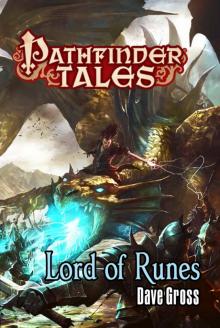 Pathfinder Tales- Lord of Runes
Pathfinder Tales- Lord of Runes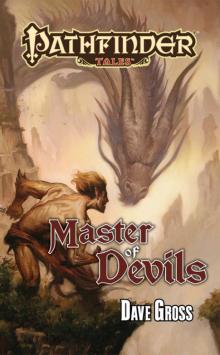 Master of Devils
Master of Devils Husks
Husks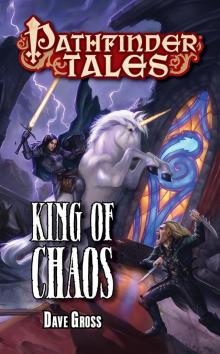 King of Chaos
King of Chaos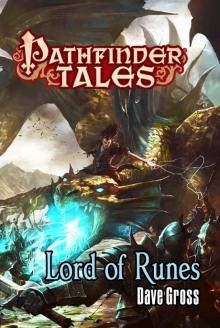 Pathfinder Tales: Lord of Runes
Pathfinder Tales: Lord of Runes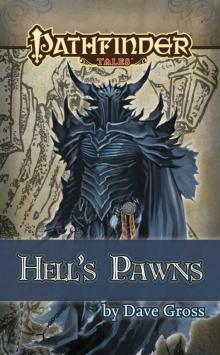 Hell's Pawns
Hell's Pawns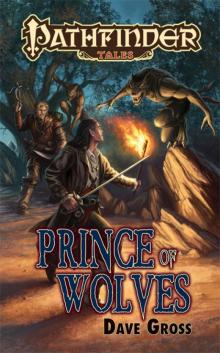 Prince of Wolves
Prince of Wolves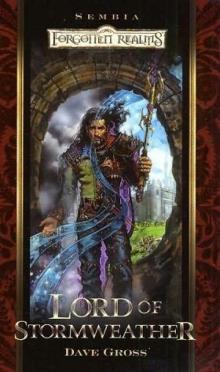 Lord of Stormweather fr-7
Lord of Stormweather fr-7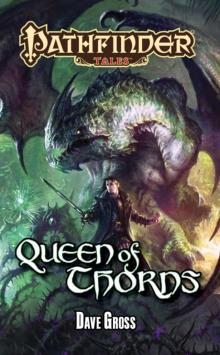 Queen of Thorns
Queen of Thorns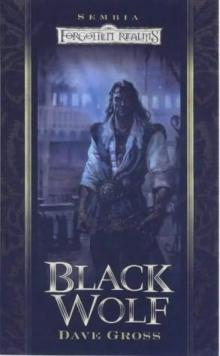 Black Wolf s-4
Black Wolf s-4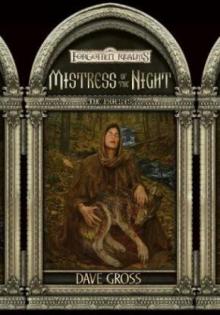 Mistress of the Night p-2
Mistress of the Night p-2